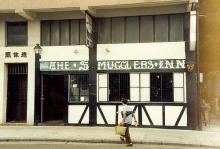6 Jan 1942, Harry Ching's wartime diary
Primary tabs
Walk to town, no transport of any sort offering. Dead body under truck at bottom of Morrison Hill still there. Near Naval Hospital a dud shell partly buried in roadway – edged away as heavy truck rushed past.
Queen's Road East lined from end to end with stalls selling all sorts of things. Much loot from abandoned homes. Then a stall that was different. A wooden bed supported on stools, and on it as though asleep an old woman, dead.
By Wellington Barracks and the Dockyard, great holes in the walls, drains blocked and water covering much of road. Beyond, more stalls on both sides of Queen's Road Central. Stalls had little of staples, and prices high. Sugar at 80 cents a pound, flour at $1.40. Peace-time prices a quarter of these.
Whole city bedraggled, depressing. Buildings shell-marked but none seriously damaged. Large Jap flag at exclusive Hongkong Club, now naval headquarters.
Harbour empty except for vessels scuttled, and waterfront deserted.
Visited Morning Post, greeted by dozen old staff. Japanese producing English paper there. Managing director Toshihito Eto and editor Ogura. Ogura cordial man, seemed decent. He publishing daily column wherein Europeans seeking missing friends or reporting own survival.
Told about thousand civilians reported for internment ordered into small Chinese hotels. European staff of Morning Post and Hongkong Telegraph confined in company's building, no food supplied, then moved to Tung Fong Hotel. Three internees there allowed out daily to buy food.

